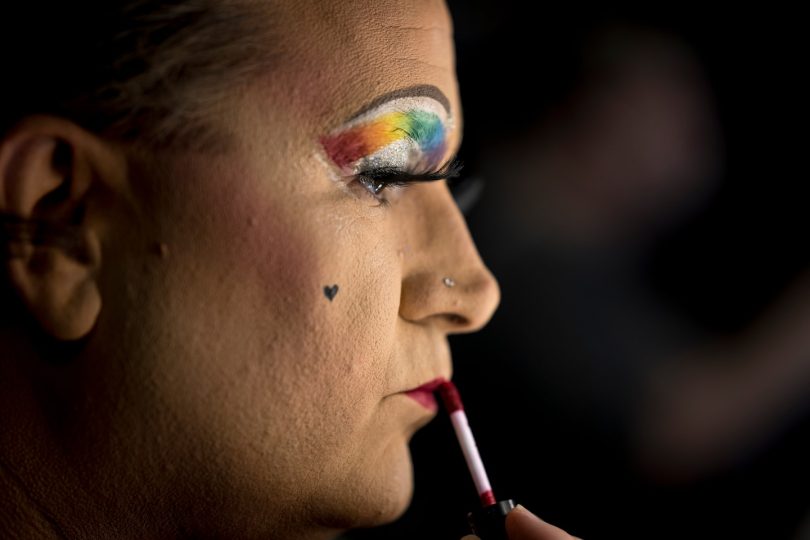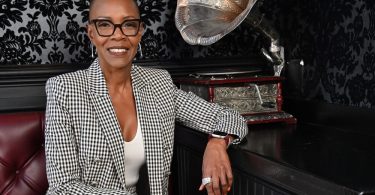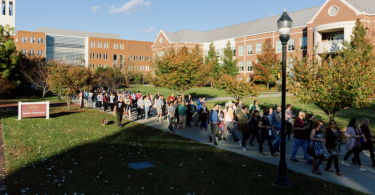LAKELAND, Fla. — The children’s “drag queen” story hour was kept under wraps given security fears. The venue’s windows were covered in black paper. Only after Jason DeShazo arrived did he change into his outfit, and he was sure to be back in street clothes, makeup wiped clean, after the private school group’s program ended.
In a state that the gay and transgender community now considers one of the most inhospitable places in the country, the 45-year-old DeShazo, a drag performer and activist, has become a target for the far right. Neo-Nazi protesters have disrupted his shows while Christian groups have tried to shut them down entirely. He’s received online death threats.
Florida passed more anti-LGBTQ+ legislation in 2023 than in the combined seven years before, according to Human Rights Campaign, and legislators have already introduced bills for the 2024 session to prohibit the use of preferred pronouns by government agencies and to ban Pride flags and other cultural symbols from public buildings.
Republican Gov. Ron DeSantis, who made fighting back against “woke” policies that support gay rights and diversity a hallmark of his presidential bid, shows no sign of moderating his rhetoric. He has continued to showcase the state as a model for his conservative vision for the nation, even as his campaign has struggled.
“As the world goes mad, Florida represents a refugee of sanity and a citadel of normalcy,” DeSantis said in May as he signed four new laws targeting the LGBTQ+ community, including one, prohibiting minors at live performances with nudity or sexual conduct, that was quickly put on hold by the courts.
People like DeShazo, who performs as the matronly “Momma Ashley Rose,” are braced for what’s ahead. “It’s mind-boggling sometimes,” he says. “There are so many things to worry about.”
Among those things is the LGBTQ+ youth center that he’s trying to establish. During a recent bingo fundraiser in a local hippie tea shop, he joined more than a dozen parents, children and others as a drag performer named Juno Vibranz called out the letter-number combinations. A barista mixed matcha lattes, and everyone munched on rice, chicken and plantains from a Caribbean food truck operator parked outside.
DeShazo wants to re-create this same homey vibe in a place that would be the “safe space” he never had as a kid growing up in a conservative church and town in central Florida: “I remember being … called to the front of the church to get rid of the devil within me, feeling if I didn’t get set free, I would burn in hell. I remember sitting there scared, really scared.”
He later sought counseling with Exodus International, the now-defunct Christian ministry that tried to “convert” gay people into being straight. He says that not until he was in his early 20s and moved to live with his grandmother in Tampa was he able to break free from the church and accept himself.
The drag persona DeShazo has developed veers away from spandex and glitz. At a performance in November, he wore a dress made of strips from his great-grandmother’s quilts and sewn by his husband, Scott. He sang a plaintive song about his coming-out experience called “What If.”
Yet with an act that he describes as “the Disney Channel of drag,” he’s not surprised that he has become a target of conservatives and religious groups.
“If you Google ‘family-friendly drag queen’ or ‘drag queen and children,’” he said, “you’re probably going to find me.”
College student Adam Reuther was among the players at bingo. He said he had found emotional harbor as a teen with the Rose Dynasty Foundation, a Lakeland-based charitable organization DeShazo launched in 2017 to support LGBTQ+ youth. One evening he was a backup dancer for a show with DeShazo’s “Momma.”
“Being there and seeing the community outpouring of all this love and support, I thought, ‘This is really something I could get used to,’ you know?’” recalled Reuther, who’s now 20 and performs in full drag, with dramatically painted eye shadow and a black-and-white wig, as harlequin character “Mistah Aphrodite.”
The game night’s admission fee brought in more than $200for the youth center, which supporters hope will include a coffee shop and a library for banned books, Vibranz told the group.
“We might even have a pool table!” parent volunteer Alizabeth Itter piped up.
“Perfect! I love it!” said Vibranz.
Outside forces aren’t making such efforts easy. For DeShazo, that has been the case since late 2022. “The start of the war,” he says.
He was applying NYX red stain to his lips before a show — a charity event with youth and drag performers — when a Lakeland police deputy appeared backstage. Demonstrators were outside, waving Nazi flags and screaming epithets. They also projected an image on the side of the building. “Make Pedophilia Punishable by Death,” it read.
The climate in Florida, a state where drag has been a celebrated art form for more than a century, has only become more hostile to performers since then.
The gay community had hoped for an allyship with DeSantis after he took office in 2019. That June, the governor attended a memorial for the victims of a mass shooting at Pulse, the gay nightclub in Orlando, pledging that Florida “will not tolerate hatred toward the LGBTQ community and Hispanic community.”
But in 2021, DeSantis signed a law vetoing trans women from playing in female sports. The following year he approved the Parental Rights in Education bill, which prohibits classroom discussion about gender and identity. When Disney opposed it, he launched a battle to control the oversight district for Walt Disney World.
A state regulatory agency began notifying venues hosting family-friendly drag shows that they were violating the state’s decency laws and could lose their liquor licenses. Three venues — two in Miami and one in Orlando — ultimately settled with the state for hefty fines.
Critics charged that DeSantis, whose press office didnot return requests for comment for this story, wasusing state powers to curtail expression that he did not approve of.
“At this point the governor wants to score political points at the expense of drag performers and the LGBTQ community,” said Carlos Guillermo Smith, senior policy adviserfor the gay rights group Equality Florida. “People feel threatened in this environment. These laws put LGBTQ families and their allies at risk.”
In March, the state education department forced an Orlando high school to cancel DeShazo’s after-school talk with students from its gay/straight alliance, questioning whether the conversation was “age and developmentally appropriate,” and warning that educators who attended could be investigated and possibly lose their professional licenses.
Then in August, members of a Christian church descended upon the Lakeland City Commission meeting, demanding it shut down DeShazo’s monthly drag brunch at a nonprofit gallery space leased from the city. The city responded that it couldn’t regulate activities with private entities in leased space unless illegal activity was taking place.
“Of course, we told them they were going to hell,” recountedPastor Victor McCleskey, the head of the KJV Baptist Church in New Port Ritchey, about an hour from Lakeland. “It’s all corrupt. I don’t consider drag a form of art. It corrupts society and perverts minds. The worry is that it will influence children to become unnatural in their thinking.”
DeSantis has signed a flurry of legislation aimed at protecting children that included a ban on transition care for minors, limiting public bathrooms to biological sex and further curbing discussion of sexual identity in schools.
The vague wording of a new law banning minors from sexually explicit performances set off a panic, according to Bryan “Brianna” Summers, a Tampa drag performer. One outdoor bar in Gulfport had to wrap its enclosure with black tarp to avoid being seen from the street, he said: “We were like baked potatoes.”
Other shows shut down or saw bookings plummet, including at a drag-themed Orlando restaurant, Hamburger Mary’s, where business dropped by 20 percent. Therestaurant quickly filed suit, saying its First Amendment rights had been violated. A lower court agreed, blocking the law.
The state pushed back, eventually asking the U.S. Supreme Court to end a temporary injunction given the ongoing litigation. Thatrequest was denied 6-3 in November, though justices Brett M. Kavanaugh and Amy Coney Barrett, while siding with the majority, said their refusal did not reflect their view on the core issue of free speech.
The outcome raises the possibility that if the actual case makes it to the high court, a majority of justices could rule in Florida’s favor, noted Steve Vladeck, a professor at the University of Texas at Austin School of Law. “Florida has been the leading edge of the sword when it comes to these very aggressive efforts to legislate in ways that are flatly inconsistent with First Amendment doctrine, with an eye toward pushing that doctrine in another direction,” he said.
DeShazo is concentrating on what he can control. His search for the right building for the youth center has gone slowly. A number of prospects had fallen through by December — at least half of them, DeShazo thought, because the building owners didn’t want the hassle of have a LGBTQ+ teen group that could attract protesters or security problems.
In between his shows and activism, he was having trouble sleeping. As he drove to performances or events, he sometimes found himself wondering if he was being followed.
“I was driving to Orlando to speak at a trans rally, and I looked at my husband and I said — this is my morbid joking sometimes — ‘well, I hope this doesn’t end like Harvey Milk,’” DeShazo said, evoking the gay San Francisco supervisor gunned down in 1978.
He stopped for a brief interview at a Lakeland sports bar on his way with a pickup full of donated Christmas presents for kids with HIV. His phone rang and he answered. A look of dismay flickered over his face before he hung up.
The owners of a building DeShazo had hoped to lease that day had accepted a better offer. The queer youth center plans were on hold once again.
Magda Jean-Louis and Scott Clement in Washington contributed to this report.







